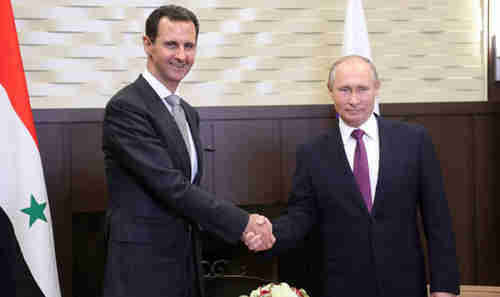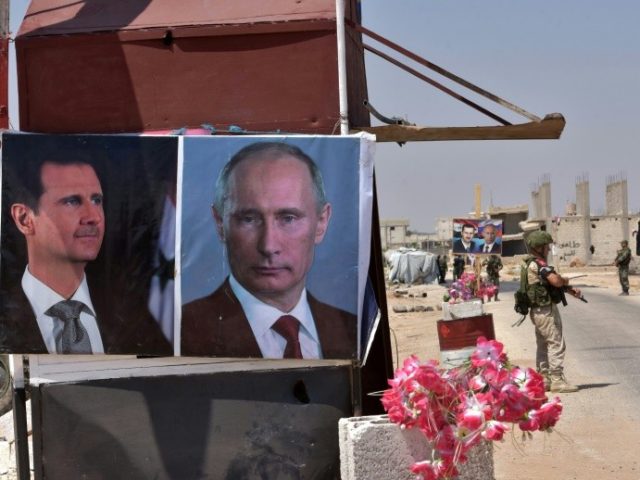This morning’s key headlines from GenerationalDynamics.com
- Russia demands U.S. and EU pay to rebuild Syria
- Putin pressures Germany’s Angela Merkel to fund rebuilding Syria
- Bolton says that Iran must withdraw from Syria
Russia demands U.S. and EU pay to rebuild Syria

Bashar al-Assad and Vladimir Putin are demanding that the West pay $250 billion to rebuild Syria (Getty)
Ever since the “Arab Spring” began in 2011, Bashar al-Assad, the Shia/Alawite president of Syria, has used peaceful demonstrations as an excuse to use missiles and barrel bombs, including Sarin gas and chlorine gas, to kill his hated Sunni enemies and to destroy their homes, markets and schools. In 2015, Russia’s president Vladimir Putin joined in with his “Grozny strategy,” where warplanes attack hospitals, schools, and markets with the objective of creating millions of refugees, who can then be attacked while they are out in the open. Between the two of them, al-Assad and Putin have destroyed and flattened villages and cities and has forced millions of innocent Syrian civilians to flee the violence into Lebanon, Jordan, Iraq, Turkey, and Europe.
Now Vladimir Putin is demanding that Europe and the U.S. should pay billions of dollars to rebuild Syria and repair all the destruction that Putin and al-Assad caused. Putin combines his demand with a threat: If you do not pay to rebuild Syria, then those millions of refugees that fled to Europe will never go home.
There are six million internally displaced refugees in Syria and five million that have fled to other countries, with 3.5 million in Turkey, almost one million in Lebanon, another million in Iraq and Jordan, and over a million in Europe. Estimates are that it will cost $250 billion to rebuild Syria.
Lebanon is strongly in favor of the policy of allowing the West to pay for rebuilding Syria so that the million or so refugees in Lebanon will leave and return home.
Lebanon’s Foreign Minister Gebran Bassil on Monday thanked Russia “for putting forward an initiative aimed at resolving the refugee issue,” and said Lebanon wants “quick, gradual, safe return of displaced Syrians that is in no way linked to a political solution.”
Bassil just wants the EU and U.S. to pour the money in, without demanding a “political solution” in return. The “political solution” would be a process that removes Bashar al-Assad from power. What is the point in rebuilding Syria, if some group is just going to start peacefully protesting, and that will cause al-Assad to destroy Syria all over again?
Russia is accusing the United States of holding up the process of rebuilding Syria. Russia would get agreement from the U.S. According to the U.S. State Department, the United States and other countries would not contribute to Syria’s full reconstruction until there was a “credible and irreversible” political process underway to end the conflict.
However, the State Department has also said that it has reached an agreement that other countries would provide $300 million to begin rebuilding Syria, including a $100 million commitment from Saudi Arabia. The National (UAE) and Reuters and Washington Post
Putin pressures Germany’s Angela Merkel to fund rebuilding Syria
Vladimir Putin has been particularly applying pressure to Germany’s Chancellor Angela Merkel. Merkel has suffered considerable backlash from her 2015 decision to allow over a million Syria refugees to arrive in Germany. Merkel’s political position would presumably be helped if many of these refugees could return to Syria.
Last weekend, Vladimir Putin met with Angela Merkel in her elegant retreat at Meseberg Palace north of Berlin.
Saying that the population of refugees is “potentially a huge burden for Europe,” he said:
We need to strengthen the humanitarian effort in the Syrian conflict. By that, I mean above all humanitarian aid to the Syrian people, and help the regions where refugees living abroad can return to. I think it’s in everyone’s interests, including Europe’s.
Unsurprisingly, Merkel made no commitment to aid but reiterated the need for constitutional reforms that would be opposed by al-Assad and elections in Syria. Merkel said the priority in Syria was “to avoid a humanitarian catastrophe,” particularly in the Idlib region, which is held by rebel groups and militants. AFP and iNews (UK) and Middle East Eye
Bolton says that Iran must withdraw from Syria
U.S. National Security Adviser John Bolton is demanding that Iran be compelled to withdraw from Syria before any negotiations on rebuilding Syria can take place, but Putin on Wednesday said that Russia cannot compel Iran to leave.
Bolton also said that Putin is “stuck” in Syria, and wants to get out:
But he also told us that his interest and Iran’s were not exactly the same. So we’re obviously going to talk to him about what role they can play.
We’re going see what we and others can agree in terms of resolving the conflict in Syria. But the one prerequisite there is the withdrawal of all Iranian forces back in Iran.
[The] Russians are stuck there at the moment. And I don’t think they want to be stuck there. I think their frenetic diplomatic activity in Europe indicates that they’d like to find somebody else, for example, to bear the cost of reconstructing Syria – which they may or may not succeed in doing.
Russia and al-Assad have been announcing and sending out their trolls to say that the war in Syria is now pretty much over, after the reconquest of Daraa in southern Syria. However, nobody serious believes that, since Idlib province still has some 2.5 million civilians and is still controlled by thousands of anti-Assad rebels, including both “moderate” rebels and militants in al-Qaeda linked Hayat Tahrir al-Sham (HTS).
In each of al-Assad’s previous targets – including Aleppo, Ghouta, and Daraa – Putin’s “Grozny strategy” was used. One particularly effective technique was to drop barrel bombs filled with metals, explosives, and chlorine gas. The metals would kill as many people as possible, and the chlorine gas, which is heavier than air, would fall into basements and bunkers where women and children were hiding. Once they were forced out into the open, additional barrel bombs and missiles or Sarin gas could kill the women an children en masse.
In each of these regions, al-Assad and Putin were forced by international pressure to permit civilians and rebels to leave the region on buses and travel to Idlib. In this way, the horrific slaughter in those regions was brought to an end through a kind of negotiated settlement.
Hundreds of thousands of people who fled to Idlib are trapped there, just south of the border with Turkey. Al-Assad has vowed to recapture Idlib in the same way as Aleppo and the others, and this certainly means the same kinds of attacks with barrel bombs, missiles, chlorine gas, and Sarin gas.
But, as analysts have been saying, “There is no Idlib for Idlib.” This means that the al-Assad will have to kill most of the 2.5 million people living there, since they will have nowhere to go. This would be a major new humanitarian crisis of gargantuan proportions. In some scenarios, Turkey might open the border and allow the refugees to flow through Turkey into Europe, creating a new European refugee crisis. This is what Angela Merkel, quoted above, meant when she said that the priority in Syria was “to avoid a humanitarian catastrophe.”
It is well to remember that Bashar al-Assad is a sociopathic monster, the worst war criminal so far this century, comparable to Stalin, Hitler, Mao and Pol Pot from the last century. Whatever fantasy Vladimir Putin is having to end the war and rebuild Syria, al-Assad will not end the war until either he is forced to or has slaughtered most of the millions of people in Idlib. Reuters and Washington Examiner and The National (UAE)
Related Articles
- Bashar al-Assad declares victory in southern Syria as opponents are bused out (22-Jul-2018)
- US increasingly expresses total disgust with Syria regime for Bashar al-Assad’s atrocities (21-Sep-2016)
- Western leaders sickened by Assad’s ‘industrial strength’ torture in Syria (22-Jan-2014)
- Syria’s Bashar al-Assad targets civilians and hospitals in never-ending war of extermination (07-Jan-2018)
- Bashar al-Assad and Vladimir Putin hug and declare the end of war in Syria (27-Nov-2017)
- Russia uses the ‘Grozny Model’ to pursue mass slaughter in Aleppo Syria (02-Aug-2016)
KEYS: Generational Dynamics, Syria, Bashar al-Assad, Russia, Vladimir Putin, Grozny strategy, Lebanon, Gebran Bassil, Jordan, Turkey, Saudi Arabia, Germany, Angela Merkel, Idlib province, John Bolton, Iran, Aleppo, Ghouta, Daraa, Hayat Tahrir al-Sham, HTS, Grozny strategy, chlorine gas, Sarin gas
Permanent web link to this article
Receive daily World View columns by e-mail

COMMENTS
Please let us know if you're having issues with commenting.